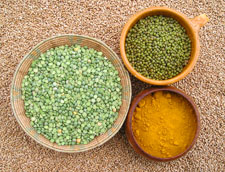
Editor’s note: Blog Action Day is an annual event, a day on which bloggers worldwide focus on one topic. The goal is create discussion around important social issues, ones that impact us all whether we realize it or not: climate change, water, poverty. This year, the topic is food. Sunday, October 16 is World Food Day, dedicated to alleviating hunger. Your choices, your values can help.
No one has an excuse any more. You can eat mindfully in a way that both minimizes your carbon-footprint and supports a decent life for those hard-working people who grow the food.
Carbon footprint:
Every one knows that vegetarianism is better for the planet. Those giant feed lots, with animals crowded hip to hip, create massive waste problems. But, I admit I’m not ready to give up meat entirely. But it’s easy to find vegetarian options that don’t feel like “giving up” anything. Try Otarian or Maoz. Both quite tasty and fast. At Otarian, the low-footprint concept is taken a step further: all its furnishings are recycled and utility services are designed to minimize carbon impact.
A big part of environmental damage is done when you finish eating: the trash left behind. Recycle, yes, of course you do. Do you really recycle everything? Look again at those plastic take-out trays. Are you sure you put them in the right place? And, no, the work of washing them out is not an excuse to toss them down the compactor instead of into the recycle bin.
Check out TerraCycle or The RecycleBank for ways to recycle more both at home, work or at your kids’ school. The effort will raise awareness in your family and community and, just as important, build up that community by working on projects together.
And then there’s the real garbage, the wet mucky stuff that you can’t recycle. But you can compost. From a worm bin in even your tiny apartment to a turning garbage into fertilizer for community gardens. Again, an opportunity to meet your neighbors and improve your neighborhood.
And to reduce your footprint even more, think about seasonality: If blueberries are out of season, how much energy was used to ship them in from somewhere else or run the hot house in which they grew? Peaches from Chile? How much jet fuel did that take?
No excuses. If everyone cut their footprint by just a bit — 3 vegetarian meals a week, more recycling, both? — imagine the difference it would make!
Supporting the people who put food on your plate
This may cost a bit more money but how much is your planet worth? How much is the dignity of a cocoa grower worth? Let’s start with the really good stuff: chocolate! Yes, I’m a choco-holic and proud to say so.
But I can feed my habit with a clear conscious by buying Madécasse, which keeps the profits with the growers in Madagascar, builds up the local economy, restores habitat, and makes a scrumptious array of chocolate bars! H-m-m-m. Just thinking about them makes my mouth water!
Or Sweet Riot, which offers delicious fair-trade chocolate, fair working conditions, and giving to nonprofits that build community. A triple-whammy from that sweet indulgence!
Now to the basics of food: coffee, bread, and the extras that make food delicious. Your choices at the market make a difference in the world.
So, too, does your choice of markets, which affects both carbon footprint and the folks feeding you. Does your market sell locally grown produce? Even the bigger stores like Whole Foods and Trader Joe’s do, so make the right choice there. Is there a green market in your neighborhood?
Yes, you may have to change your eating habits. Those year-round peaches are so tempting! But, as the slogan down on Wall Street the other day said, “Live simply so others can simply live.”
What will you do make the food supply more sustainable?
